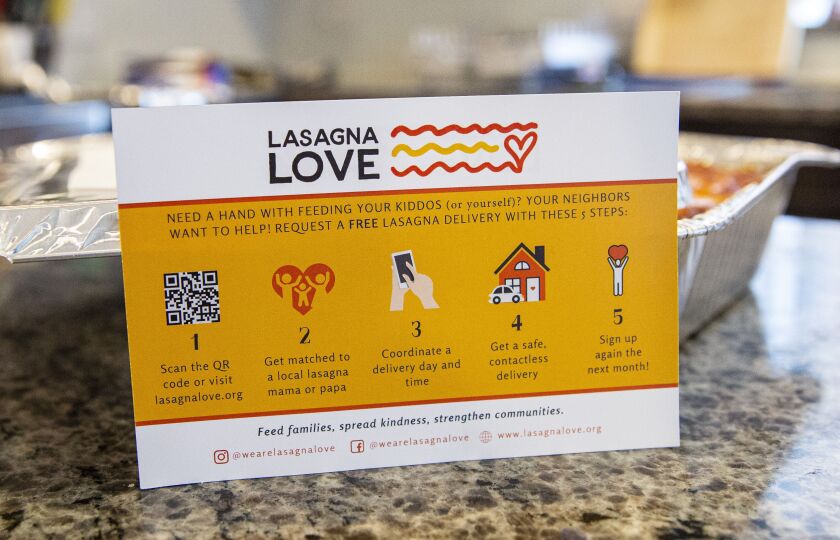The aroma of lasagna has seeped through the Sieracki household for a good part of the last three months.
“My family is a little tired of it, I’m not going to lie,” Marci Sieracki said in jest.
But the cheese and noodle-layered dish that Sieracki has been whipping up sometimes more than twice a week since December isn’t necessarily for her family’s consumption.
Sieracki is the regional director of the Midwest branch of Lasagna Love, a nonprofit organization that provides warm meals — primarily lasagnas — to people in need.
“I’ve always felt like food is kind of my love language, it’s a good way to express that I care about somebody,” Sieracki said. “When I heard about [Lasagna Love], I felt like this was something... I wanted to be a part of.”
Rhiannon Menn, a nomad mom blogger, came up with the idea of Lasagna Love last March when she saw how the coronavirus pandemic negatively impacted many people in a lot of different ways and caused food insecurity for some communities.
Menn began making lasagnas — the ultimate labor of love dish — for her neighbors in need in San Diego and documenting it on social media. Some of her followers joined in, helping out their own communities.
It has since blossomed into a national social-media campaign and is currently active in more than 1,000 cities in all 50 states and Puerto Rico. The movement is powered by the more than 20,000 Lasagna Mamas and Papas, who are matched with neighbors in need of a meal and possibly other items.
“I like the idea of like neighbors helping neighbors,” Sieracki said. “During this time of a lot of uncertainty, for me, it really helped me feel like I was able to do something.”
The Chicago branch of Lasagna Love had been busier than ever last month, distributing almost 5,000 dishes in one week. That’s more than the national weekly average of Lasagna Love, whose website says it provides about 4,000 meals in a week span.
“One of the things that we try to emphasize is that we’re no judgement,” Sieracki said. “People will send me messages and they’ll be like, ‘Well do I qualify?’ And my answer is always, ‘Yes.’ Anyone who asks for help qualifies. We want to take away the stigma of asking for help, especially for women.
“During this pandemic, a lot has fallen on women, on our shoulders and we want to make it easier for them to ask for help,” continued Sieracki, who added that people can nominate themselves or others online. “There isn’t any judgment on our part, we don’t need to know your life story, or the reasons why you’re asking for help. We want to help you.”
Ann Sikora-Jackson, of West Town, was one of the hundreds of thousands of Lasagna Love recipients over the last year.
Sikora-Jackson spent the last year being the primary caretaker of her mother, who is in hospice and had Alzheimer’s Disease. She did this while also caring for her family and working full-time as a physician assistant in the emergency department of Stroger Hospital.
“It’s been a very long, lonely year,” Sikora-Jackson said. “And it kind of was a lonely, isolating process because we couldn’t have people come and visit really because of COVID.”
A friend nominated Sikora-Jackson in January knowing her family was going through a difficult time. At that point, Sikora-Jackson was barely sleeping as she was providing her mother around-the-clock care in her final days.
“The last thing I wanted to do was figure out what to cook for dinner,” Sikora-Jackson said. “.... [Lasagna Love] made it so easy. They reached out, they asked about allergies and things and delivered the meal and our front doorstep. I was really overwhelmed with emotion. It’s fantastic that they do that in our community.”
Receiving a meal at that time was a “tremendous amount of relief” for Sikora-Jackson, who hopes to provide that same sense of comfort to someone else in her community in the near future.
“It takes just the pressure off of deciding what are we all going to eat today?” she said. “I think it’s really wonderful. ... I would love to give my time or my ability to cook to and/or [donate] financially just to help this organization thrive because I think it’s just just so incredible what they’re doing.”







